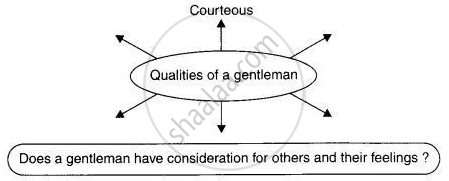Advertisements
Advertisements
Question
What do you understand by the following statement?
Yet in both these boyish faces there was a seriousness which was far beyond their
years.
Solution
The narrator was deeply impressed by the childish and artl ess expression of the faces of Nicola and Jacopo. They appeared to him to be very innocetc and simple. But he also noticed a seriousness on their feces which could never be found on the faces of the children of their age. The narrator means that in their looks and age, they were innocent children but in their thinking and actions they appeared to be quite mature. The seriousness which maturity brings on the faces of responsible elderly persons was present on faces of these two small boys aged thirteen and twelve.
APPEARS IN
RELATED QUESTIONS
What are the qualities of a "gentleman"? Work with your partner and complete
the following web-chart by listing the qualities of a gentleman.

Based on your discussion above, what do you think the story is about?
Based on your reading of the story answer the following question by ticking the
correct option.
Nicola was not pleased when Jacopo asked the narrator to drive them to Poleta as he
Based on your reading of the story answer the following question by ticking the
correct option.
The boys were the first to join the resistance movement against the Germans because
Based on your reading of the story answer the following question by ticking the
correct option.
The author did not speak to the boys on their return journey because.
What do you understand by the following statement?
"We do many things, sir," Nicola answered seriously. He glanced at us hopefully.
What do you understand by the following statement?
He smiled uncomfortably. "Just plans, sir," he answered in a low voice.
Discuss the following question and write the answers in your notebook.
Appearances are deceptive. Discuss with reference to the two boys.
As the narrator, write an article on the lesson of love, faith and trust that you have
learnt from the two young boys of Verona.
Read the given excerpt and answer the questions briefly.
| “Well," I said, "we're leaving on Monday. Is there anything I can do for you before we go?" Nicola shook his head, but suddenly Jacopo said, “Sir," he burst out, "every Sunday we make a visit to the country, to Poleta, 30 kilometres from here. Usually we hire bicycles. But tomorrow, since you are so kind, you might send us in your car." I had already told Luigi he might have the Sunday off. However, I answered, “I'll drive you out myself." There was a pause. Nicola was glaring at his young brother in vexation. "We could not think of troubling you, sir." "It won't be any trouble." |
- Identify the phrase that indicates that the visit to Poleta on Sundays is significant as a routine or tradition. (1)
- What does the narrator's offer to drive the brothers to Poleta reveal about his character? (1)
- Why was there a pause after the narrator’s offer? (1)
- State one reason why Jacopo might have wanted a car ride despite the choice of hired bicycles? (1)
